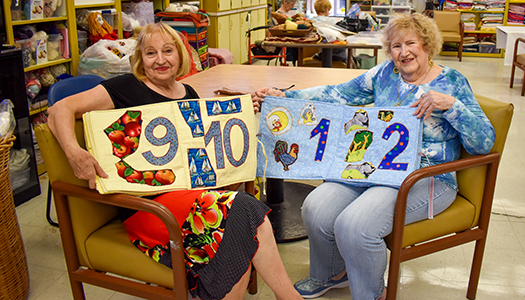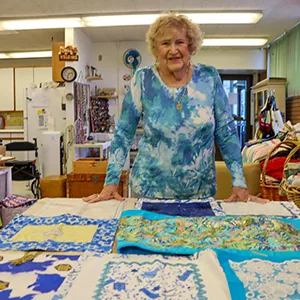At Los Angeles Jewish Health, Celebrating the Art (and Craft) of Creative Possibility


At Los Angeles Jewish Health, Celebrating the Art (and Craft) of Creative Possibility
Ninety-year-old Los Angeles Jewish Health resident Norma Garber is passionate about her craft. Trained as a dressmaker during her youth in England, Norma has spent a lifetime honing her sewing abilities – skills she deploys with stunning results as one of the most prolific artisans at work in the vibrant Arts and Crafts Room on the Eisenberg Village campus.
Norma’s creations take a wide variety of forms. “I’ve made clothing, table runners, placemats, bottle bags for wine or any kind of liquor, challah covers, matzo covers, and more,” she says. “I dedicate about five hours each day to the Arts and Crafts Room, and it is absolutely my happy place.”
For Norma, the effort is its own reward. “I do it for love, plain and simple,” she says. “It also allows me to give back to LA Jewish Health because I sell the things I make, and the proceeds get reinvested, so we always have a steady stream of supplies to use.”

All visitors to the campus have access to this wonderful trove of incredible handicrafts, notes Radka Falk, the longtime creative force behind LA Jewish Health’s arts and crafts activities. “Everything we make is available for purchase, and it’s all one-of-a-kind,” she says.
Radka emigrated from Bulgaria in 2000 and found her way to employment at Los Angeles Jewish Health six years later. As an expert craftsperson in her native country, the job in the Arts and Crafts Room fits her like a beautifully sewn glove.
“I feel blessed to work here and to spend time with our amazing residents; I love them, they love me – and love is always inspirational,” she says. “Doing all this stuff I’m passionate about is such a pleasure. When my daughter came to work with me one day and saw the Arts and Crafts Room, she said, ‘It looks like they created this job just for you!’”
Whether it’s sewing, knitting, or designing, “Radka can do anything – you have no idea how talented this woman is!” Norma says. “She’s the number one reason I come to the Arts and Crafts Room every day; she’s what makes it so special.”
The feeling, says Radka, is mutual. “Norma gives her heart and soul to this place, and the things that she and the other residents produce are truly extraordinary,” she enthuses.
Radka, Norma, and the rest of the Arts and Crafts Room crew often take their show on the road, setting up displays at Los Angeles Jewish Health support group luncheons and other events to advertise their offerings. “Our items sell beautifully,” Norma says. “The most popular items are probably the things we make for babies.”
But interested shoppers need not wait for a special event to peruse the Arts and Crafts Room wares. “Especially as people start to think about buying holiday gifts, they should know they can come see us anytime,” Radka says. “I’m here Monday through Friday from 7:30 am to 4 pm, and I’m always available to show people around!”
